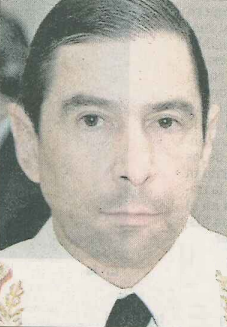Ricardo Brinzoni on:
[Wikipedia]
[Google]
[Amazon]
 Ricardo Brinzoni (October 6, 1945 – October 24, 2005) was an
Ricardo Brinzoni (October 6, 1945 – October 24, 2005) was an
Clarín. 26 de octubre de 2005) After the return to democracy, he was accused of involvement in the ''
 Ricardo Brinzoni (October 6, 1945 – October 24, 2005) was an
Ricardo Brinzoni (October 6, 1945 – October 24, 2005) was an Argentine
Argentines (mistakenly translated Argentineans in the past; in Spanish (masculine) or (feminine)) are people identified with the country of Argentina. This connection may be residential, legal, historical or cultural. For most Argentines, s ...
military officer, serving as Argentina's Chief-of-staff.
Born in Buenos Aires, Brinzoni entered Military School on 1963, and trained as a paratrooper, qualifying in December 1964. He built a career in the military and reached the rank of brigadier general in 1990. In the 1990s he served as military attaché
A military attaché is a military expert who is attached to a diplomatic mission, often an embassy. This type of attaché post is normally filled by a high-ranking military officer, who retains a commission while serving with an embassy. Opport ...
in Uruguay. On December 13, 1999, President Fernando de la Rúa appointed Brinzoni as Army Chief-of-staff and a lieutenant general.
During the military government
A military government is generally any form of government that is administered by military forces, whether or not this government is legal under the laws of the jurisdiction at issue, and whether this government is formed by natives or by an occup ...
of 1976–1983, Brinzoni was secretary-general of the military government of Chaco Province.Murió Brinzoni, que fue jefe del Ejército con De la Rúa y DuhaldeClarín. 26 de octubre de 2005) After the return to democracy, he was accused of involvement in the ''
Massacre of Margarita Belén
A massacre is the killing of a large number of people or animals, especially those who are not involved in any fighting or have no way of defending themselves. A massacre is generally considered to be morally unacceptable, especially when per ...
'', in which 22 political prisoners were executed on December 13, 1976.
While in command of the Army, he suggested bringing together human rights groups, the Catholic Church and the Army to form a "reconciliation panel" in order to find out the whereabouts of the " desaparecidos". Nevertheless, he was heavily criticised for defending the repression and military illegal actions of the military government, for allegedly protecting the officers involved, and for setting back the reconciliation process that had been started by his predecessor, Martín Balza
Lieutenant General Martín Antonio Balza (13 June 1934 Salto, Buenos Aires) is an Argentine military former Chief of Staff of the Argentine Army. From 2003 to 2011 he was Argentine ambassador to the Republic of Colombia.
A man of strong democr ...
. Brinzoni courted further controversy when it was revealed that his lawyer during this period, Juan Enrique Torres Bande, was a member of the neo-Nazi
Neo-Nazism comprises the post–World War II militant, social, and political movements that seek to revive and reinstate Nazism, Nazi ideology. Neo-Nazis employ their ideology to promote hatred and Supremacism#Racial, racial supremacy (ofte ...
New Triumph Party.
Following Néstor Kirchner's inauguration as President in 2003, Brinzoni was retired and replaced by Roberto Bendini. Brinzoni subsequently issued several public statements criticising Kirchner's government.
Brinzoni was married to the former Lidia María Rosa Odino; they had
three children and two grandchildren. He died of pancreatic cancer
Pancreatic cancer arises when cell (biology), cells in the pancreas, a glandular organ behind the stomach, begin to multiply out of control and form a Neoplasm, mass. These cancerous cells have the malignant, ability to invade other parts of t ...
in Buenos Aires in 2005, aged 60.
References